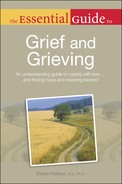Book Description
Debra Holland, a psychotherapist and specialist in grief counseling, shares her indispensable knowledge in The Essential Guide to Grief and Grieving, tackling the difficult questions about how men and women, young and old, cope with loss. This accessible, inspiring, and insightful guide helps readers understand the various kinds and levels of grief, how people are trained to experience grief, the theories concerning the stages in the journey of grief, and ways to get through the pain and achieve some level of comfort.
- Includes solid concrete advice to help the healing process.
- Features dozens of real-life stories.
- Helpful for those who counsel the grieving as well as those who've experienced loss.
